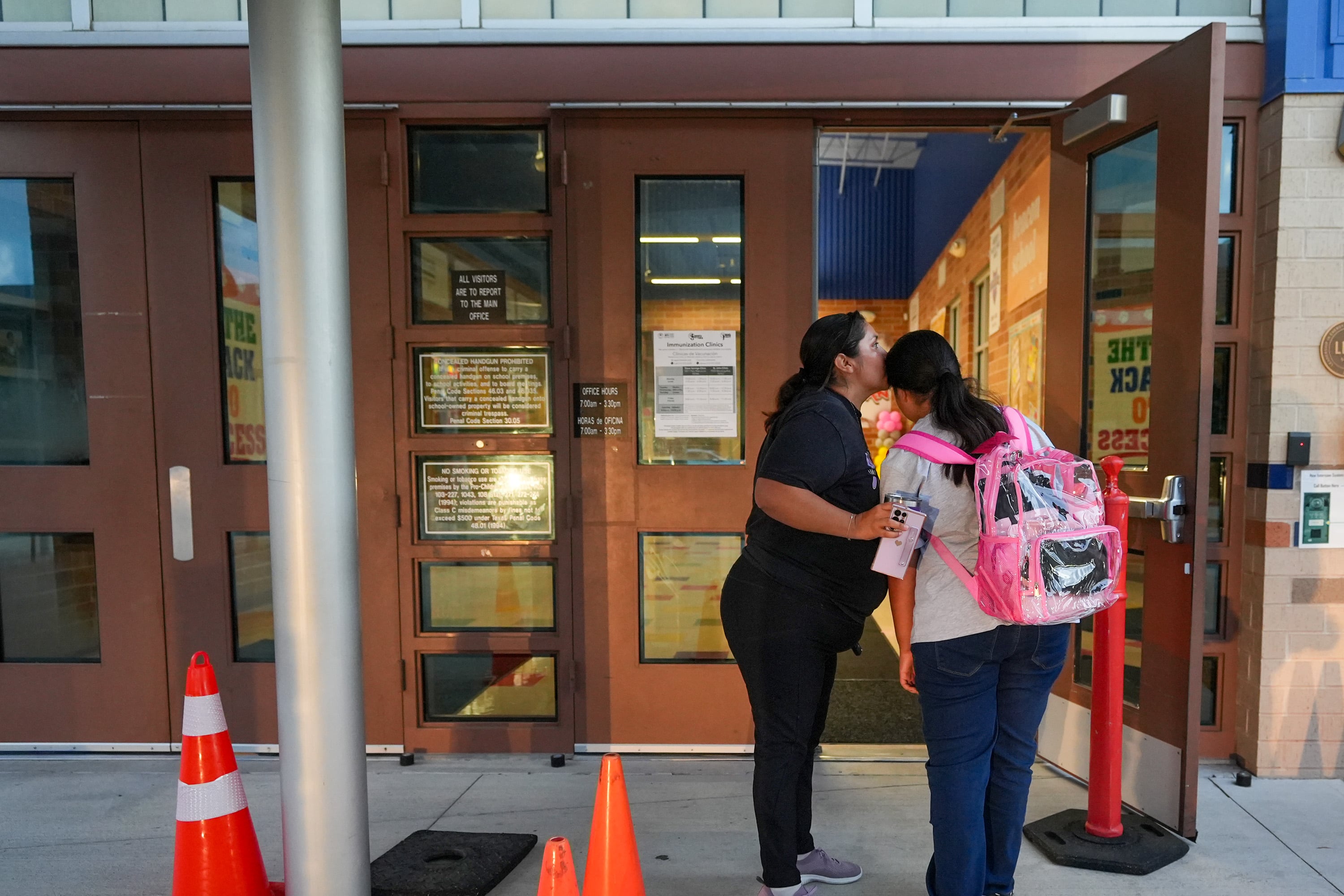Sign up for Chalkbeat’s free weekly newsletter to keep up with how education is changing across the U.S.
Dramatic increases in immigration arrests could be hurting students in the classroom, including U.S. citizen students from Spanish-speaking households.
A study released Monday as a working paper from the National Bureau of Economic Research uses test score data from a large countywide school district in Florida and immigration arrest data to track the impact of increased enforcement after President Donald Trump took office. Study authors David Figlio and Umut Özek found modest but noticeable declines in spring test scores compared with recent years.
The test score declines didn’t just affect foreign-born students. The effect, which was concentrated in high-poverty schools and among students who were already struggling, was similar for Spanish-speaking immigrant and U.S. citizen students.
That’s “compelling evidence” that students are affected by being part of a community that’s subject to more scrutiny and arrests, regardless of their own or their parents’ immigration status, said Figlio, a University of Rochester economist.
Florida students take state standardized tests three times a year, allowing researchers to see how students were doing before and after immigration enforcement increased under the Trump administration. The analysis found that each percentage point increase in immigration enforcement intensity reduced Spanish-speaking students’ scores on state tests by an amount equivalent to about 10 to 15 points on the SAT.
This decrease accounted for about 10% of the average test score gap between English- and Spanish-speaking students in the district, the study found. The study does not name the district; researchers often grant anonymity to districts and organizations in exchange for data access.
Higher-performing Latino and Spanish-speaking students largely maintained their scores when compared with peers from previous years, but lower-performing students did not.
“This is not turning a kid who was knocking it out of the park into a kid who is struggling academically, but it does appear to be a drag on kids who were already struggling,” Figlio said.
The study adds to a body of research that had already established wide-ranging effects of immigration enforcement on young people, from increased anxiety to higher dropout rates. But this new research reflects the impacts of much more intense interior enforcement efforts under Trump.
Increased immigration enforcement was also associated with a decline in disciplinary incidents for both Latino students and Spanish-speaking students. Figlio and Özek are not sure if this was because students tried to avoid getting in trouble, or if administrators responded with more leniency out of sympathy for student hardships, or if they wanted to avoid exposing students to law enforcement.
Figlio and Özek did not find significant impacts on students’ attendance in the school district they studied, but other recent studies have.
Thomas Dee, a Stanford University education professor, found a 22% increase in daily absences in the two months after a January immigration raid in California’s Central Valley, an agricultural region with large numbers of immigrant farmworkers. That was a sharp deviation from attendance patterns in previous years.
Absences were higher among elementary students, perhaps because parents worried more about being separated from young children.
Another recent study from Kirsten Slungaard Mumma at Columbia University’s Teachers College found increased absences among English learners in both Connecticut and Rhode Island.
In the past, including under the first Trump administration, interior enforcement more often took the form of large workplace raids, which might affect a large number of families in one community.
In recent months, federal agents have raided apartment complexes, arrested parents and teens outside school buildings, and recently dragged a Chicago child care worker from the center where she worked. The Trump administration did away with a longstanding policy that deemed schools and day cares “sensitive locations” where immigration enforcement was largely prohibited.
Administration officials say they are targeting violent criminals. Public records show that many of those detained have no criminal record or committed only minor offenses. ProPublica documented at least 170 incidents in which federal immigration agents detained U.S. citizens, sometimes for days.
“This is an era of immigration enforcement unlike any in recent memory in terms of its intensity and scope,” Dee said. From a research standpoint, acute events like the Central Valley raids are easier to study — there’s a distinct before and after — but immigration enforcement now is an “everywhere and always” phenomenon, he said.
Figlio and Özek try to account for that by tracking increases in immigration arrests by country of origin, identifying schools with a higher percentage of students from those countries, and comparing test scores in schools that serve more and less affected communities.
One Latino mother in Chicago, who lives in a part of the city that’s been targeted by federal immigration agents, said her son traditionally earned As and Bs and is taking several advanced courses this year as a high school sophomore. She’s now noticing more Cs. (Chalkbeat is not identifying the mother due to the sensitivity of her situation and privacy concerns.)
The family doesn’t go out as much, the mother said. Her son is watching videos of alleged ICE activity on social media, and hearing from friends who are worried their families will be targeted by ICE. One of her son’s teachers told her, “before he was more participative and turning everything in, and now sometimes he falls asleep,” she said.
Figlio said his study doesn’t tell us what U.S. immigration policy should look like, but it does point to places where students may need more support.
“Educators are responsible for educating all the students who go to school,” he said. “School districts might want to put more resources into schools that have a lot of foreign-born students and students from the countries that are subject to more enforcement, and not just for the kids who are foreign-born but for everyone.”
Chalkbeat Chicago reporter Reema Amin contributed reporting.
Erica Meltzer is Chalkbeat’s national editor based in Colorado. Contact Erica at emeltzer@chalkbeat.org.





